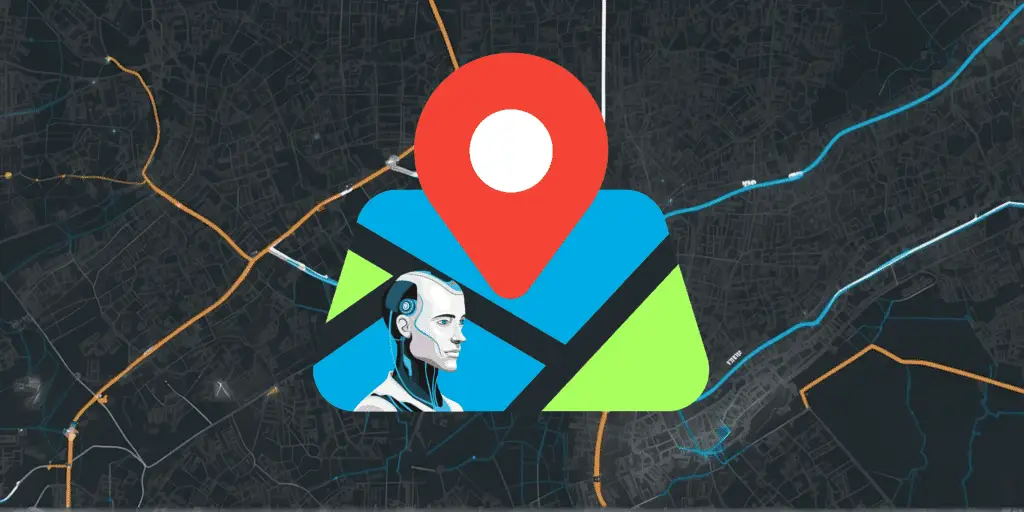Google Maps is embarking on a transformative journey by introducing a cutting-edge generative artificial intelligence feature to revolutionize how users discover new places.
This innovative feature integrates large language models to analyze the platform’s vast database of over 250 million locations and the contributions from its community of over 300 million Local Guides.
This integration enables Google Maps to offer personalized, conversational search experiences, allowing users to find recommendations for everything from niche thrift shops with a vintage vibe in San Francisco to dog-friendly, gluten-free pizza places.
As Google Maps evolves from a navigation tool to a comprehensive discovery platform, this feature marks a significant milestone in leveraging AI to enhance user interaction and satisfaction.
This introduction sets the stage for a detailed exploration of Google Maps’ generative AI feature, its operational mechanics, the data it leverages, its phased rollout, and the broader implications for AI in enhancing digital discovery experiences.
Google Maps’ Generative AI Feature
The generative AI feature in Google Maps leverages the power of LLMs to sift through its extensive database, which includes information on over 250 million locations and insights from more than 300 million Local Guides.
Users can input conversational queries, such as “places with a vintage vibe in SF” or “gluten-free pizza places that are dog-friendly,” the AI analyzes this input to generate personalized recommendations.
These suggestions are not just lists of places. Still, they are organized by categories, complete with photo carousels and review summaries to provide a comprehensive overview.
This feature is designed to make the search experience on Google Maps feel more conversational and interactive. After the initial query, users can ask follow-up questions that the AI will understand and respond to within the context of the ongoing conversation.
For example, if a user inquiries about thrift shops and then asks, “How about lunch?” the AI can recommend restaurants that align with the vintage theme or any other specified criteria from the initial query.
Google Maps’ AI-driven feature excels at handling niche or specific queries, making it possible for users to discover places that perfectly match their preferences or requirements.
This level of personalization is a significant advancement over traditional keyword-based searches, which often return generic results that require further filtering by the user.
Initially rolled out as an early access experiment in the U.S. to select Local Guides, the feature is set to become available to a broader audience shortly.
This phased approach allows Google to gather valuable feedback and fine-tune the AI’s performance, ensuring that it provides accurate and relevant recommendations across various queries.

Data and Contributions
The generative AI feature of Google Maps is deeply rooted in the platform’s vast data repository and the extensive contributions from its global community of users.
This synergy between technology and human input forms the backbone of the AI’s ability to deliver personalized and contextually relevant recommendations. Here’s how data and contributions play a critical role in powering this innovative feature:
Google Maps houses information on over 250 million locations worldwide. This includes the geographical coordinates of places and detailed descriptions, categories, business hours, contact information, and more.
The richness of this data allows the generative AI to have a comprehensive understanding of each location, enabling it to make sophisticated connections between user queries and potential places of interest. Local Guides, a community of over 300 million members, contribute significantly to the depth and accuracy of Google Maps data.
These members provide reviews, photos, and factual information about the places they visit, offering insights beyond what can be gleaned from official sources.
The AI leverages these contributions to understand the ambience, popularity, and user experiences associated with different locations, which is crucial for generating nuanced recommendations. The AI feature considers the quantitative ratings given to locations. It delves into the qualitative insights provided by user reviews and photos.
By analyzing this content, the AI can identify themes and preferences specific to the user’s query, such as the restaurant’s atmosphere or the uniqueness of a shop’s inventory. This analysis helps curate lists of places that are relevant and align with the user’s expectations and interests.
The dynamic nature of Google Maps’ database ensures the AI feature always works with the most current information. Real-time updates from businesses and users about changes in operating hours, temporary closures, or new openings are crucial for providing accurate recommendations.
This responsiveness is especially important when circumstances affecting local businesses and attractions change rapidly. In leveraging this vast amount of data, Google Maps is mindful of privacy concerns and the responsible use of user-generated content.
The platform employs sophisticated algorithms to ensure that recommendations are generated in a way that respects user privacy while providing valuable and personalized suggestions.
Early Access and Rollout
The rollout of Google Maps’ generative AI feature begins with an early access experiment, initially made available to select Local Guides in the United States.
This strategic move allows Google to tap into the insights and feedback from a knowledgeable and engaged community of users familiar with Maps’ functionalities and the needs of fellow users.
By choosing Local Guides for the initial phase, Google ensures that the feedback collected will be insightful and actionable, helping refine and improve the AI’s accuracy and relevance.
The decision to start with an early access phase underscores the company’s commitment to a gradual, feedback-driven development process, which is crucial for addressing the complexities and nuances of integrating generative AI into a platform as widely used as Google Maps.
Looking forward, Google plans to extend the availability of this feature to a broader audience, signalling a future where more users can benefit from personalized, AI-driven discovery experiences.
Although the company has not specified a timeline or which other countries will gain access next, the mention of future expansion indicates Google’s intention to bring this innovative feature to users worldwide, transforming how people explore and interact with their surroundings through Maps.
User Experience and Interaction
The introduction of generative AI into Google Maps significantly enriches the user experience and interaction, moving beyond traditional search functionalities to offer a more conversational and personalized discovery process.
Users can now engage with Google Maps more dynamically and intuitively, entering queries in natural language and receiving tailored recommendations beyond mere listings to include organized categories, photo carousels, and review summaries.
This AI-driven approach allows for a seamless flow of conversation; for instance, after searching for specific types of venues, users can follow up with related questions or expand their search criteria without starting from scratch.
The AI understands the context of previous inquiries, making it possible to explore a wide range of interests—from dining and shopping to entertainment and leisure activities—within a single, coherent interaction.
This level of personalization and responsiveness transforms Google Maps from a simple navigation tool into a comprehensive personal guide, making every search a step towards discovering new favourites and experiencing the world more meaningfully.
Through this feature, Google Maps aims to create a more engaging, efficient, and enjoyable experience for all users, encouraging exploration and discovery with the help of advanced AI technology.
Comparison with Previous Updates and Other Tools
Integrating generative AI into Google Maps signifies a pivotal advancement in the application’s development, markedly enhancing how users interact with the service for discovery and exploration.
This progression builds upon previous enhancements, incorporating the sophistication of large language models to interpret and respond to natural language queries with personalized, context-aware suggestions.
Unlike earlier updates that introduced functionalities like live traffic updates, street views, and user-generated reviews, this new feature elevates the user experience by facilitating a conversational interface that dynamically understands and adapts to user preferences and search contexts.
This shift towards a more intuitive and interactive platform indicates Google’s broader strategy to embed AI across its ecosystem, mirroring initiatives in other Google services such as Bard and AI-enhanced Search functionalities.
These efforts aim to streamline access to information, making it more accessible, relevant, and personalized. This innovative approach also brings to the forefront challenges common to AI-driven tools, such as maintaining accuracy, minimizing biases, and preserving user trust.
By initially launching this feature to a select group of Local Guides for early access, Google underscores its commitment to refining the technology through real-world feedback, ensuring that it meets and exceeds user expectations.
This methodical, feedback-oriented development process reflects Google’s overarching aim to leverage AI in transforming how users engage with digital environments, striving to offer unparalleled personalization and efficiency in the quest for information and discovery.
Challenges and Concerns
While innovative, the integration of generative AI into Google Maps brings with it a set of challenges and concerns that Google must navigate carefully. One of the primary challenges is ensuring the accuracy of AI-generated recommendations.
Given the vast and varied data the AI processes, there’s a risk of inaccuracies or “hallucinations” where the AI might generate misleading information.
This is particularly critical for a tool like Google Maps, where incorrect data could lead to confusion or misdirection. Additionally, there’s the concern of maintaining user trust, especially as AI-generated summaries and suggestions become more prevalent.
Users rely on Google Maps for accurate, up-to-date information, and any erosion of trust could undermine the platform’s credibility. Privacy concerns also loom, as the feature’s effectiveness hinges on leveraging large amounts of user data and contributions.
Ensuring that this data is used responsibly and with respect for user privacy is paramount. Moreover, there’s the challenge of avoiding biases in AI-generated content, ensuring that the recommendations are inclusive and reflect diverse options without unfairly favouring certain businesses or locations.
While the feature aims to enhance user experience by simplifying discovery, there’s a risk that over-reliance on AI could lead to a homogenization of recommendations, potentially stifling diversity and the serendipity of discovery.
As Google navigates these challenges, the success of its generative AI feature in Google Maps will depend not just on its technical prowess but also on its ability to address these concerns thoughtfully and transparently.
Future of Generative AI in Google Services
The future integration of generative AI across Google’s suite of services heralds a transformative era where digital interactions become more intuitive, personalized, and efficient.
This technological evolution points towards a scenario where services like Google Search, Gmail, and the Google Workspace suite, including Docs, Sheets, and Slides, will employ advanced AI to offer real-time assistance, from generating nuanced search responses to automating routine communications and creatively assisting with content creation.
Such capabilities promise to streamline workflows, enhance productivity, and offer personalized user experiences at an unprecedented scale. The potential of generative AI to improve accessibility and inclusivity across Google’s platforms cannot be overstated; by adapting services to meet diverse user needs and preferences, Google can ensure its technologies are more accessible to all.
Ethical and privacy considerations will take centre stage as these advancements progress, necessitating a responsible approach to AI development and deployment. Google’s commitment to navigating these challenges thoughtfully will be crucial in maintaining user trust and ensuring the responsible use of AI.
In essence, the incorporation of generative AI into Google services is set to redefine our digital landscape, making our interactions with technology smarter, more adaptive, and increasingly aligned with our individual needs and contexts.

Final Thoughts
The integration of generative AI into Google Maps and its prospective expansion across Google’s services underscores a pivotal shift towards more intelligent, responsive, and user-centric digital experiences.
This evolution reflects Google’s commitment to harnessing AI’s power to enhance its platforms’ functionality and utility and reimagine how users interact with technology daily.
By prioritizing personalization, efficiency, and accessibility, Google is setting a new standard for the role of AI in shaping the future of digital services.
As this technology continues to evolve, the balance between innovation and the ethical use of AI emerges as a critical focal point.
Google’s approach to addressing privacy concerns, ensuring data protection, and promoting inclusivity will significantly determine the success and acceptance of generative AI features among users worldwide.


